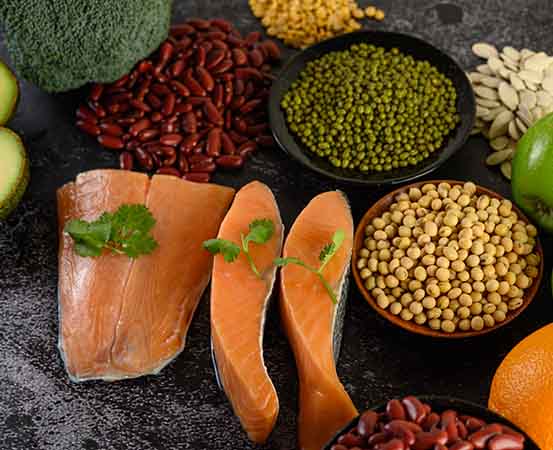
For people with heart issues, doctors and nutritionists highly recommend picking the most natural and non-greasy foods for consumption. These heart-healthy foods can help the heart to function well by pumping blood without any obstruction.
According to Bengaluru-based dietician Ranjini Raman, when it comes to heart health, it’s all about including a good number of micronutrients through fruits and vegetables for better antioxidant absorption that can help blood vessels to relax and function well.
She explains including minerals such as potassium and vitamins like folate (vitamin B-9) and vitamin C in the diet helps keep blood pressure under control and protects the heart by reducing cholesterol levels.
According to experts, some natural foods that work wonders for the heart are:
Fibre-rich whole grains
“Fibre aids digestion in a big way. When you have good digestion, the unwanted and unhealthy fats won’t get deposited in the arteries and blood vessels,” explains Bengaluru-based dietitian Deepalekha Banerjee. Dietary fibre – both soluble and insoluble – helps reduce cholesterol levels.
She also adds that it is best to stick to fibre-rich complex carbohydrates like oats and millets like sorghum (jowar), pearl millet (bajra), foxtail millet (kakum), finger millet (ragi), buckwheat (kuttu) apart from multigrain flour. Rice – preferably brown – is also fine to consume.
“Omega 3 fatty acids in oats and millets also help decrease triglycerides or the bad cholesterol in the blood which is a risk factor for atherosclerosis,” she explains.
Fruits
Whole fruits comprising berries, oranges, melons, grapes, avocados, apples etc are recommended as heart-friendly fruits.
While most of these fruits are rich in vitamins, minerals and antioxidants, if heart patients have comorbidities like diabetes or obesity, they need to consult their dietitian first. “However, having neutral fruits like apple and guava is ok, but fruits like mangoes and grapes need to be avoided by people with diabetes,” suggests Banerjee.
Raman says instead of juicing the fruits, it is better to have them with skin on so that you get the fibre.
“Your dietitian will be the best person to suggest what foods to consume and what to avoid,” says Banerjee. Fruits also contain micronutrients and minerals like magnesium which is known to be heart-healthy.
Vegetables rich in complex carbs
Most doctors and nutritionists recommend including a lot of colourful vegetables in your grocery list. “The proportion of the veggies should be more than the portion of carbohydrates,” says Raman.
“Your meals can include or begin with salads comprising plenty of tomatoes, purple cabbage, green leafy vegetables, beetroots and carrots which fill you up and help you maintain an ideal weight and lipids,” suggests Raman. Banerjee recommends green leafy vegetables over root and tuber vegetables.
“The carb quantity doubles up if you consume the root and starchy vegetables along with carbohydrates like roti or rice,” she explains. So, it is better to watch the portion if you are consuming those. You can steam, bake, boil or sauté the vegetables in little oil for maximum benefits.
Healthy good fats
For a heart-healthy diet, it is important to distinguish between good and unhealthy fats and know what portions of good fats must be included in the diet. “Including healthy fats in the form of nuts (almond, walnuts, pistachio), seeds (chia, flax), fatty fish etc can increase the good cholesterol [HDL] that can protect the heart further,” says Raman.
According to Raman, unhealthy fats such as refined oils, butter and other saturated and trans fats need to be kept minimal for better heart health.
Seed-based oils (like gingelly and mustard oil) have been found to be rich in Omega 3 and Omega 6. So, both are good for the heart. You can alternate between oils and cook with different oils on different days.
Banerjee says pure ghee also aids digestion and keeps acidity or heartburn at bay. However, you have to be cautious about the portions you consume and not go overboard with the quantity.
Egg
According to Delhi-based nutritionist Kavita Devgan, eggs help cut down the risk of heart disease because of a lesser-known compound called betaine, which helps reduce levels of homocysteine (ie amino acids, high levels of which are associated with heart disease) in the blood. “So, when there are less plasma homocysteine concentrations in blood, it reduces the risk of cardiac disease,” she says.
According to Banerjee, eggs are full of nutrition, but when it comes to protein intake it is the quantity a person consumes according to his or her weight, height and condition that matters.
Low-fat dairy
Banerjee says it is acceptable for heart patients to consume dairy provided they go for toned or skimmed milk products. It is best to make paneer, curd and buttermilk using these low-fat milk at home.
Apart from heart-healthy, natural foods, another important habit for heart health is to keep yourself hydrated, says Banerjee. “Beyond all this, including two to three litres of water daily can promote healthy blood circulation and enables the heart to work properly.”
Takeaways
A healthy diet is an essential component of your cardiac wellness chart. Experts point out that a high fibre-complex carb-rich diet is the best option to ensure heart health through diet alone. They also point out that not all fats are bad for the heart and in fact, some of the good fats should be added to the diet to ensure the proper functioning of the heart.

















5 Responses
Very useful in daily life
Good and relevant information on nutrition
Gone through all written contents liked it .
I am also aware of my health .In future I will read your content regarding health .
Good information for good health
Thank you for your positive feedback!